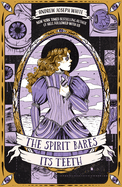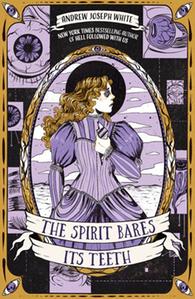
 Andrew Joseph White's sophomore novel, The Spirit Bares Its Teeth, is a riveting, spellbinding Victorian horror about a neurodivergent trans boy desperate to escape the life his family has planned for him.
Andrew Joseph White's sophomore novel, The Spirit Bares Its Teeth, is a riveting, spellbinding Victorian horror about a neurodivergent trans boy desperate to escape the life his family has planned for him.
White begins with narration by the spirit of Frances, describing how doctors killed her and dissected her body. The focus then shifts to 16-year-old Silas, whose violet eyes allow him to interact with spirits by lifting the Veil between the mortal world and the spirit world. Silas sees this ability as a curse and wishes he could live as his true self and become a surgeon like his older brother. His parents, though, exploit his power and force him to suppress his trans identity. They believe that if Silas hides who he is and stifles his neurodivergent traits, he will be ideal marriage material.
After an unsuccessful attempt to avoid an arranged marriage, Silas is diagnosed with "Veil sickness" and placed against his will in an abusive sanitorium for violet-eyed medium girls who need to be "cured." As he investigates why residents keep disappearing, Silas lives closeted: "I just need to find a way out.... And until then, I will keep myself safe. That is not self-betrayal. That is self-preservation."
Silas's expressive first-person narration is made even more powerful by how he communicates with his deepest fears, which he manifests as a little gray rabbit that lives in his chest. In italicized text, the creature verbalizes Silas's anxiety, self-doubt, and ingrained self-loathing by attacking him with threats and cruel epithets. Spirit girls like Frances also narrate sporadically, and the circumstances surrounding their deaths contribute to the suspense.
White shows in this sharp, tense novel the same kind of visceral prose that garnered such acclaim for his debut, Hell Followed with Us. He paints an authentic and painfully tender portrayal of Silas's neurodivergent and trans identities, the former of which his parents and society have trained him to mask for the comfort of others. "My tutors called me callous and unfeeling," he thinks. "I'm not.... I just express things differently."
In his author's note, White explains that the book was inspired by "Victorian England's sordid history of labeling certain people 'ill' or 'other' to justify cruelty against them." The plot's candid, often gory accounts parallel the stunningly rendered characters whose physical and emotional wounds bleed out onto the pages. --Kieran Slattery, freelance reviewer, teacher, co-creator of Gender Inclusive Classrooms
Shelf Talker: A neurodivergent trans teen fights for his survival in this striking, spellbinding Victorian YA horror novel.

